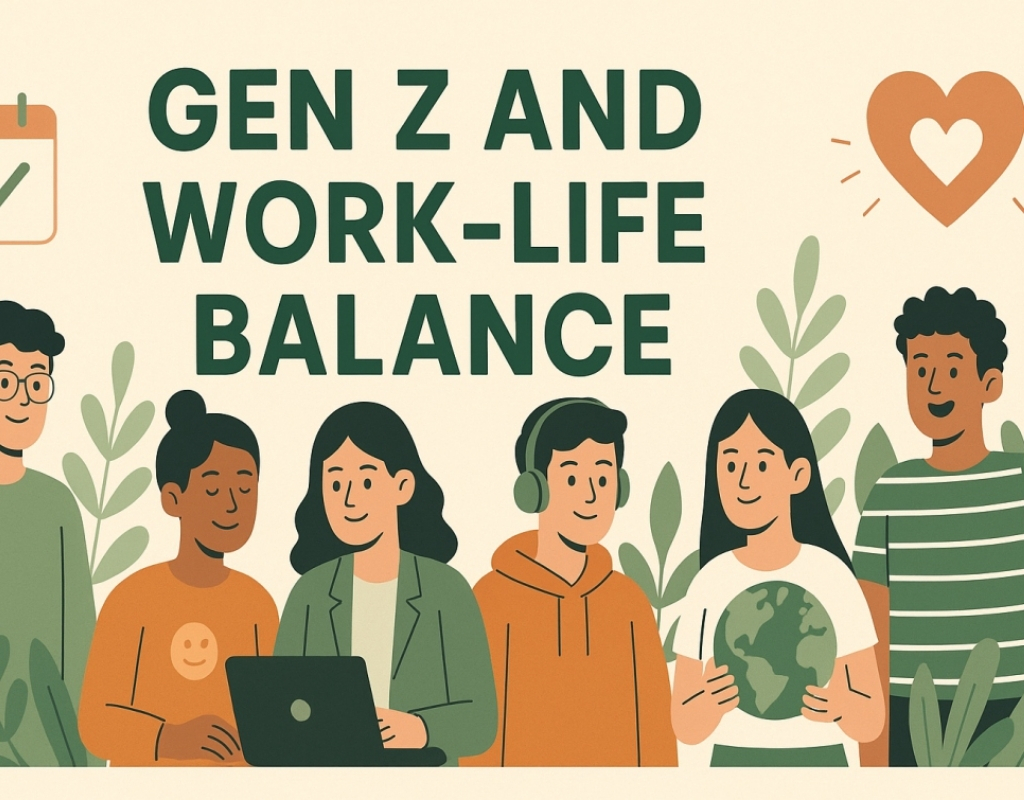HOW GEN Z IS REDESIGNING WORK-LIFE BALANCE

In the ever-evolving landscape of the modern workplace, Generation Z is emerging as a transformative force, reshaping traditional notions of work-life balance. Born between 1997 and 2012, this generation is not simply following trends but driving a fundamental cultural shift in how professional and personal lives coexist.
1. Prioritizing Mental Health and Well-being
For Gen Z, mental health is non-negotiable. A significant 62% of Gen Z professionals rank health and well-being as their top priority, with 57% identifying burnout prevention and mental wellness as their biggest challenges. Unlike previous generations, they are vocal about their needs, which has led to a surge in workplace wellness programs ranging from therapy sessions to mental health days. Companies are realizing that a healthy workforce is also a productive workforce, prompting a re-evaluation of policies to better support employees’ holistic well-being.
2. Embracing Flexibility and Autonomy
The rigid 9-to-5 structure is no longer the gold standard. 73% of Gen Z professionals prefer hybrid work models, blending remote and in-office setups. Flexibility extends to time-off policies, sabbatical opportunities, and personalized work schedules, enabling employees to manage their commitments more effectively. The result? Greater job satisfaction, productivity, and loyalty.
3. Seeking Purpose-Driven Employment
For Gen Z, a paycheck alone isn’t enough work must be meaningful. A Deloitte study found that 77% of Gen Z want to work for organizations making a positive impact on society. This has pushed companies to integrate sustainability, social justice, and ethical practices into their missions. Purpose-driven employment has become a key factor in attracting and retaining top Gen Z talent.
4. Redefining Career Trajectories
Long tenures at a single company are being replaced with dynamic and flexible career paths. Gen Z employees value growth opportunities, continuous learning, and evolving roles aligned with their interests. This shift has led organizations to rethink career development, offering skill-building programs, mentorship, and competitive benefits to retain ambitious, fast-moving talent.
5. Advocating for Inclusivity and Diversity
As the most ethnically and racially diverse generation in history, Gen Z demands workplaces that reflect inclusivity. They expect genuine diversity, equity, and inclusion (DEI) initiatives—ranging from diverse hiring practices to representation in leadership roles. For Gen Z, inclusivity is not just an HR checkbox but a core workplace expectation.
6. Integrating Work and Life Seamlessly
Unlike previous generations, Gen Z doesn’t strive for a rigid separation between work and life; they advocate for a seamless integration. Enabled by technology, remote work, and digital collaboration, they blend professional responsibilities with personal interests in ways that feel natural and fulfilling.
Conclusion
Generation Z is not merely joining the workforce they are revolutionizing it. By prioritizing mental health, demanding flexibility, seeking purpose, redefining careers, and championing inclusivity, they are reshaping workplace culture. The traditional concept of work-life balance is being replaced by a holistic, integrated approach, paving the way for a healthier, more fulfilling professional life for future generations.

Hands United for Lifelong Aid and
Human
Upliftment Lever Foundation
Since 2012
ALL CONTACTS
-
Registered Office:
1/5 Parel Shivshandesh CHSL., Kasturba Gandhi Nagar, LR Papan Marg, Worli, Mumbai 400018. -
Branches:
Worli, Charni Road, Kalyan, Pune - +91-8082376061 , +91-8369001611
- hulahulgrp@gmail.com
SUPPORT US
If you wish to contribute to our mission, you can make a donation via bank transfer to the following account:
Bank Details
Name: HULAHUL Foundation
Bank: IDBI Bank
Account Number: 0026104000273299
IFSC Code: IBKL0000026
Branch: Prabhadevi


Leave a Reply